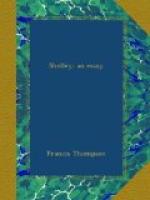The finest specimens of this faculty are probably to be sought in that Shelleian treasury, Prometheus Unbound. It is unquestionably the greatest and most prodigal exhibition of Shelley’s powers, this amazing lyric world, where immortal clarities sigh past in the perfumes of the blossoms, populate the breathings of the breeze, throng and twinkle in the leaves that twirl upon the bough; where the very grass is all a-rustle with lovely spirit-things, and a weeping mist of music fills the air. The final scenes especially are such a Bacchic reel and rout and revelry of beauty as leaves one staggered and giddy; poetry is spilt like wine, music runs to drunken waste. The choruses sweep down the wind, tirelessly, flight after flight, till the breathless soul almost cries for respite from the unrolling splendours. Yet these scenes, so wonderful from a purely poetical standpoint that no one could wish them away, are (to our humble thinking) nevertheless the artistic error of the poem. Abstractedly, the development of Shelley’s idea required that he should show the earthly paradise which was to follow the fall of Zeus. But dramatically with that fall the action ceases, and the drama should have ceased with it. A final chorus, or choral series, of rejoicings (such as does ultimately end the drama where Prometheus appears on the scene) would have been legitimate enough. Instead, however, the bewildered reader finds the drama unfolding itself through scene after scene which leaves the action precisely where it found it, because there is no longer an action to advance. It is as if the choral finale of an opera were prolonged through two acts.
We have, nevertheless, called Prometheus Shelley’s greatest poem because it is the most comprehensive storehouse of his power. Were we asked to name the most perfect among his longer efforts, we should name the poem in which he lamented Keats: under the shed petals of his lovely fancy giving the slain bird a silken burial. Seldom is the death of a poet mourned in true poetry. Not often is the singer coffined in laurel-wood. Among the very few exceptions to such a rule, the greatest is Adonais. In the English language only Lycidas competes with it; and when we prefer Adonais to Lycidas, we are following the precedent set in the case of Cicero: Adonais is the longer. As regards command over abstraction, it is no less characteristically Shelleian than Prometheus. It is throughout a series of abstractions vitalised with daring exquisiteness, from Morning who sought:
Her eastern watch-tower, and her
hair unbound,
Wet with the tears which should
adorn the ground,
and who
Dimmed the aerial eyes that kindle day,
to the Dreams that were the flock of the dead shepherd, the Dreams
Whom near the living streams
Of his young spirit he fed; and
whom he taught
The love that was its music;




